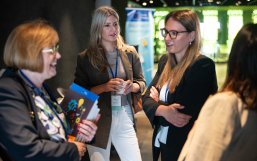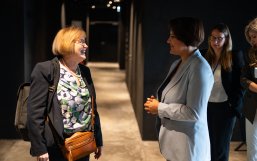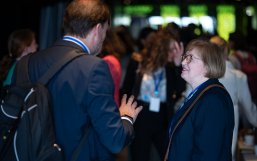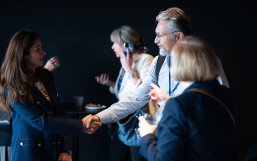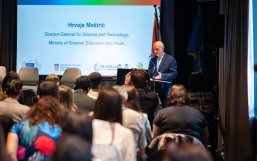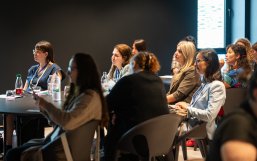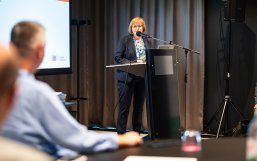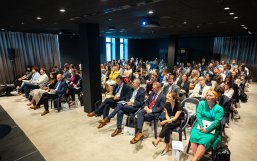Insights from the Knowledge Valorization Tour de Capitales Event in Zagreb
On June 4th, the Ministry of Science, Education, and Youth hosted the first-ever National Knowledge Valorisation Day. This event was part of a larger campaign organised by the European Commission’s Directorate-General for Research and Innovation called "Tour de Capitales,". which aims to highlight the importance of knowledge valorisation in making the research results work for society.
The purpose of the knowledge valorisation conference is to introduce attendees to the most recent developments in knowledge valorisation policies and how they can be implemented into practice.
Dr. Hrvoje Meštrić, the Director of the Directorate for Science and Technology, took the stage to extend a warm welcome to the audience, underscoring the important role of technology transfer and knowledge valorisation in fostering innovation and economic growth. Joining him, Mrs. Signe Ratso, the Deputy Director-General of the Directorate-General for Research and Innovation of the European Commission, echoed these sentiments in her online address, acknowledging the Ministry's proactive initiatives that resonate with both European and global movements towards nurturing the innovation ecosystem.
Following this, Ana Varjačić, Head of Sector for EU Programmes and Projects at the Ministry of Science and Education, presented on "Building the National Technology and Knowledge Transfer Ecosystem." Subsequently, Marko Ostojić, Digital & CRM Lead at Pontus Pharma, provided insights into the business perspective on knowledge valorisation. This was followed by Deni Nurkić, Co-lead of deep-tech venture builder Nuqleus at ICENT, who discussed "Mission Possible: Linking Science with Business in Croatia."
Following the presentations, a policy debate ensued focusing on the essence of knowledge valorization – the process of extracting social and economic value from knowledge by integrating various sectors and industries, and by translating research outcomes into sustainable solutions that benefit society. The debate centred on developing a learning system and fostering connections among communities to maximise the value and impact of knowledge. Panellists included dr. Hrvoje Meštrić, the Director of the Directorate for Science and Technology; Ioannis Sagias, Deputy Head of the Unit for Valorization Policies and IPR at the European Commission; Todor Milchevski, Senior Private Sector Specialist at the World Bank; Ozren Polašek, Director of the Croatian Science Foundation; Špela Stres, Director of the Slovenian Research and Innovation Agency; and Ananay Aguilar, Head of TenU in the United Kingdom. The discussion delved into existing policies aimed at enhancing knowledge valorization and potential improvements to further enhance its impact. Participants exchanged ideas on fostering collaboration, leveraging resources, and implementing innovative strategies to harness the full potential of knowledge for societal benefit.
European IP Helpdesk Support at the Event: Skills and Capacity for Knowledge Valorization Session
In this session, we explored the intersection of knowledge valorization and intellectual asset management. Additionally, we introduced a novel approach to knowledge valorization, emphasising the need for equilibrium between economic and societal value pathways, as articulated in the Code of Practice on the management of intellectual assets for knowledge valorization. The discussion was moderated by Smiljka Vikić-Topić, Senior IP & Innovation Advisor at the European IP Helpdesk and Head of Office at RISE.
Florentina Golisteanu (Legal and Policy Officer, Knowledge Valorisation and IPR Policies, DG Research and Innovation) provided valuable insights into the latest EU policies regarding knowledge valorization, including the Guiding principles for knowledge valorisation and implementing Codes of Practice with the focus on the Code of Practice on the management of intellectual assets for knowledge valorisation. ,
In line with these new policies that call for the best possible use of the research results and all generated intellectual assets, Johan Moyersoen (General Manager, Impact Licensing Initiative) further elaborated on these policies, emphasising the significance of maximising the utilisation of research outcomes and intellectual assets. He illustrated this with examples of how Social impact licensing enables companies to dramatically expand their societal value creation potential and how this goes hand-in hand with economic returns on investment, thereby encouraging inventors to actively engage in the knowledge valorization process. Contrary to the common notion that public research either solely focuses on non-commercial aspects or to revenue generation, the impact licensing approach offers a dual benefit: it generates both commercial and societal value for technology holders. Michele Dubbini (IP and Innovation Advisor, European IP Helpdesk) then introduced the support and services provided by the European IP Helpdesk, emphasising their tailored assistance for various needs, including participation in informative webinars and direct inquiries.
Lastly, with the assistance of Jure Vindišar (Head of Technology Transfer Service at the National Institute of Biology, Slovenia) and Krystian Gurba (Deputy Director at the Centre for Technology Transfer CITTRU at the Jagiel-lonian University in Kraków, Poland), we delved into the knowledge valorisation systems in Slovenia and Poland, drawing inspiration for potential improvements in Croatia. This exploration highlighted opportunities for enhancing performance and leveraging the emerging knowledge valorisation system to achieve greater research impact, aligning with established practices in EU and other Western countries.
The event served as a significant platform for fostering dialogue and collaboration in the realm of knowledge valorisation and intellectual assets management. With engaging presentations, insightful discussions, and fruitful exchanges, participants gained valuable insights into the latest EU policies, innovative approaches to knowledge valorisation, and practical strategies for maximising research impact. The diverse perspectives shared by speakers and panellists underscored the importance of leveraging knowledge for both economic and societal benefit, driving home the message that effective knowledge valorisation is essential for fostering innovation and driving sustainable development.
RISE team, strengthened by Michele Dubbini (our Eurice colleague), impressed the participants with our outstanding track record and the number of ongoing projects. The audience included key Croatian innovation ecosystem stakeholders, Ministry of Science, Education and Youth representatives, national funding agencies, researchers, technology transfer office representatives, and venture capital representatives. It was a fantastic opportunity to connect, share, and impress. Overall, it was a day full of learning, networking, and inspiring discussions. We can't wait to see the incredible outcomes from this event!

